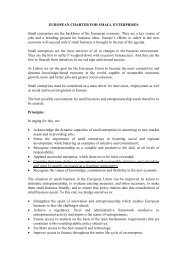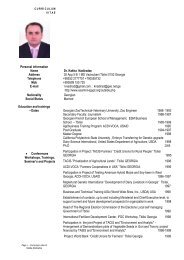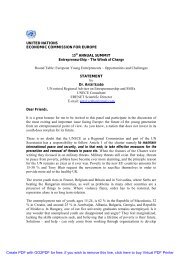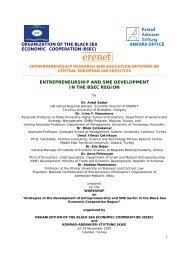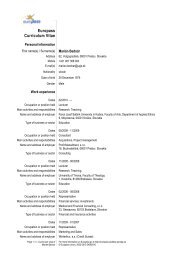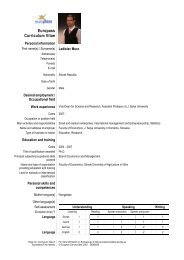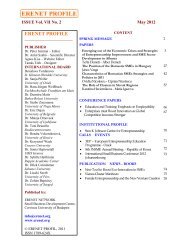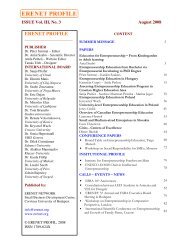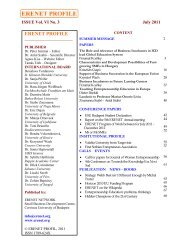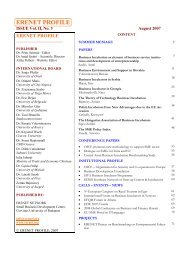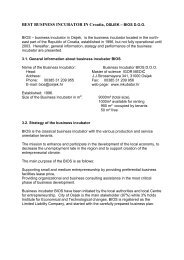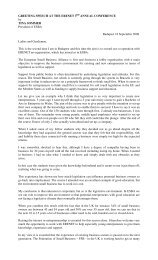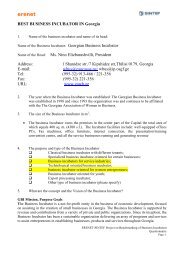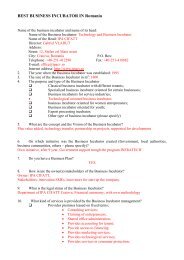Tomasz Marek Mickiewicz Born 24 December 1960 Nationality ...
Tomasz Marek Mickiewicz Born 24 December 1960 Nationality ...
Tomasz Marek Mickiewicz Born 24 December 1960 Nationality ...
Create successful ePaper yourself
Turn your PDF publications into a flip-book with our unique Google optimized e-Paper software.
department in late 1980s, at the Catholic University of Lublin, a unique place in the Sovietbloc, where rigorous economic discussion could be pursued with no outside interference. In1988 and 1989 I co-organised two influential conferences, which led to enormous mediaresonance and attracted those people who were later to become the key policy makers, whenthe transition programme was eventually implemented in 1990. For the first time, we wereable to discuss openly the necessity of enterprise reform and support for the private sector as aprerequisite for successful transition to a more efficient economic system.Since then, most of my contributions have been focused on microeconomic aspects, andprimarily on the control structures of industrial enterprises. In particular, several papers Iwrote and co-authored considered the role of labour in enterprises and the implications forwage and employment decisions, a theme which continued to be highly policy-relevant, dueto the design of the privatisation programmes in the transition economies. With thesubsequent unravelling of the transition process, enterprise-level analysis led me also toconsider the dynamic aspects of the transfer of ownership and control, namely theprivatisation process. One of my two most quoted articles (Baltowski and <strong>Mickiewicz</strong> 2000)considers the Polish privatisation programme outcomes (i.e. control structures of enterprises)as an interaction between the institutional framework, economic interests and ideas. Theendogeneity of ownership structures is also addressed in the empirical paper written jointlywith Igor Filatotchev and Kate Bishop (2002).On a parallel line of research, I have also been working on the implications of ownershiptransfer for both employment and wage decisions in enterprises, considering the temporaryeffects of privatisation, and contrasting privatised firms with both state firms and new privatefirms. I was one of the few researchers, who provided empirical evidence pointing to the factthat the difference between the ‘new private’ and ‘old’ firms (i.e. both state-owned andprivatised) may be as important as the traditionally considered difference between the stateand private sector. This is now becoming a popular point of view in the literature on thesubject.Gradually, my interest in corporate control and the role of ‘insiders’ in enterprises, led to amore direct focus on corporate governance issues, which, in turn, are also inherently linked tofinancial economics. Within this area, the 2001 paper with Igor Filatotchev led to a number ofcitations. The innovativeness of the paper is that it develops the idea that debt may not be ashard a disciplining device as is normally perceived: the collusion of banks (offeringintermediated finance coupled with closer individualised monitoring) with controllingstakeholders may easily lead to expropriation of minority shareholders. Much of my currentwork can be traced back to this paper, and remains at the inter-section of the comparativeeconomic systems and corporate governance issues. The selection of the paper on corporategovernance, exporting and performance (written jointly with Igor Filatotchev and NataliaIsachenkova), as one of the best papers at one of the most competitive and prestigiousconferences (Academy of Management Annual Meeting 2005), with over 5,000 submissionsfrom around the world, indicates that my current collaborative work in this area has met withmuch interest.My two books (2000; 2005) refer to the central themes in the economic transition literature.The book, which I co-authored in 2000, on ‘Unemployment in Transition’ ‘provides newinsights’ and also ‘is enjoyable to read’ (review in the Journal of Comparative Economics, 29,2001, pp. 770-772). It presents a model of transition, which is based on the differences inbehaviour of enterprises and demonstrates how privatisation interacts with fiscal issues. Thework expands in an original manner one of the central themes in the transition literature, i.e.<strong>Tomasz</strong> <strong>Marek</strong> <strong>Mickiewicz</strong>, page 8



